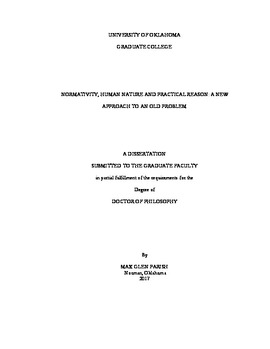| dc.contributor.advisor | Zagzebski, Linda | |
| dc.contributor.author | Parish, Max | |
| dc.date.accessioned | 2017-05-11T18:42:15Z | |
| dc.date.available | 2017-05-11T18:42:15Z | |
| dc.date.issued | 2017-05-12 | |
| dc.identifier.uri | https://hdl.handle.net/11244/50791 | |
| dc.description.abstract | Neo-Aristotelian ethical naturalism (henceforth: Aristotelian naturalism) claims ethical goodness is a kind of human natural goodness, where natural goodness is a function of human nature. Call this the core thesis. The normativity objection claims the core thesis fails because ethical goodness is normative and natural goodness is not. In this study I aim to cast new light on this objection and propose a new strategy of response. My argument divides into two main moves. In the first, I side with critics in arguing that Aristotelian naturalism has a serious problem that concerns the normativity of human nature, although standard formulations of the normativity objection do not quite capture it. The problem is that there is an explanatory gap in Aristotelian naturalism’s account of ethical goodness. I argue that although facts about human nature and natural goodness are irreducibly normative in the evaluative sense, they are not necessarily normative in the practical sense. Hence, Aristotelians need to explain what makes such facts practically normative. They have not successfully done this. This explanatory gap threatens the viability of Aristotelian naturalism, for it leaves a central feature of ethical experience—viz. the practical normativity of ethical facts—unexplained. I call this the normativity problem. In the second main move of my argument I propose a two-part solution to the normativity problem. The first part consists in a new metanormative account of the source of normativity I call Aristotelian constructivism. It yields an objectivist, species-relative and naturalistic account of practical normativity. The second part of the solution is an account of practical reason that connects human final ends with human nature. Aristotelian constructivism explains the practical normativity of those final ends, and thus of facts about human nature, without reference to the evaluative status of those facts. Aristotelian constructivism thereby enables Aristotelian naturalists to retain their core thesis. | en_US |
| dc.language | en_US | en_US |
| dc.subject | Philosophy | en_US |
| dc.subject | ethics | en_US |
| dc.subject | Human Nature | en_US |
| dc.subject | Normativity | en_US |
| dc.title | Normativity, Human Nature and Practical Reason: A New Approach to an Old Problem | en_US |
| dc.contributor.committeeMember | Cortest, Luis | |
| dc.contributor.committeeMember | Ellis, Stephen | |
| dc.contributor.committeeMember | Judisch, Neal | |
| dc.contributor.committeeMember | Snow, Nancy | |
| dc.date.manuscript | 2017-05-10 | |
| dc.thesis.degree | Ph.D. | en_US |
| ou.group | College of Arts and Sciences::Department of Philosophy | en_US |
| shareok.nativefileaccess | restricted | en_US |
